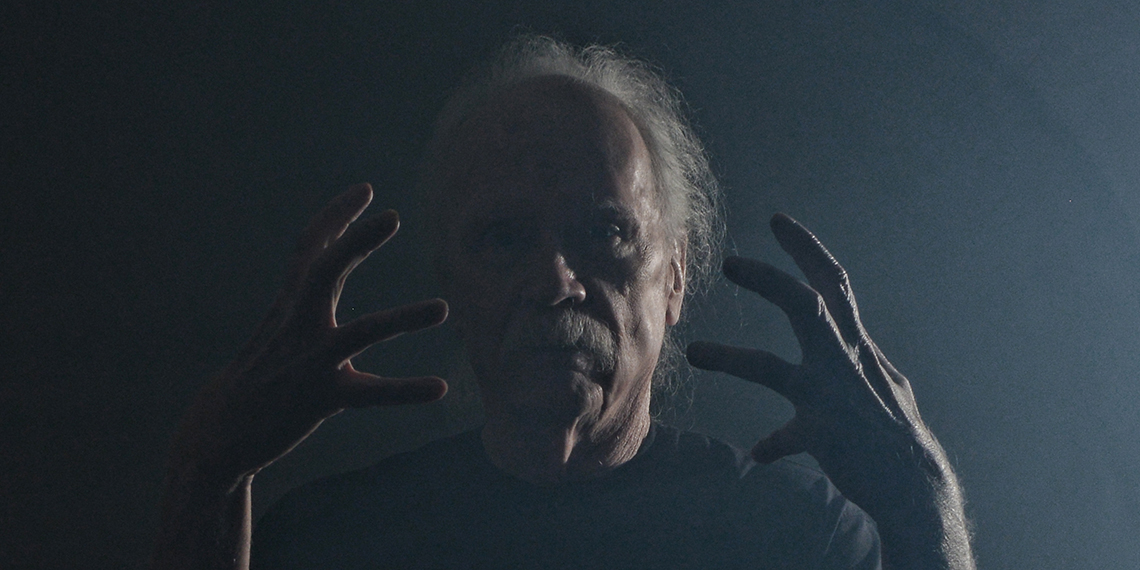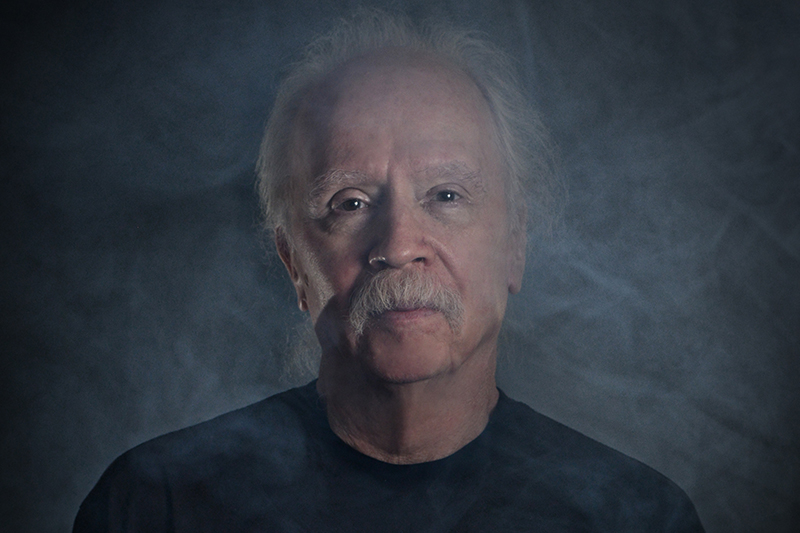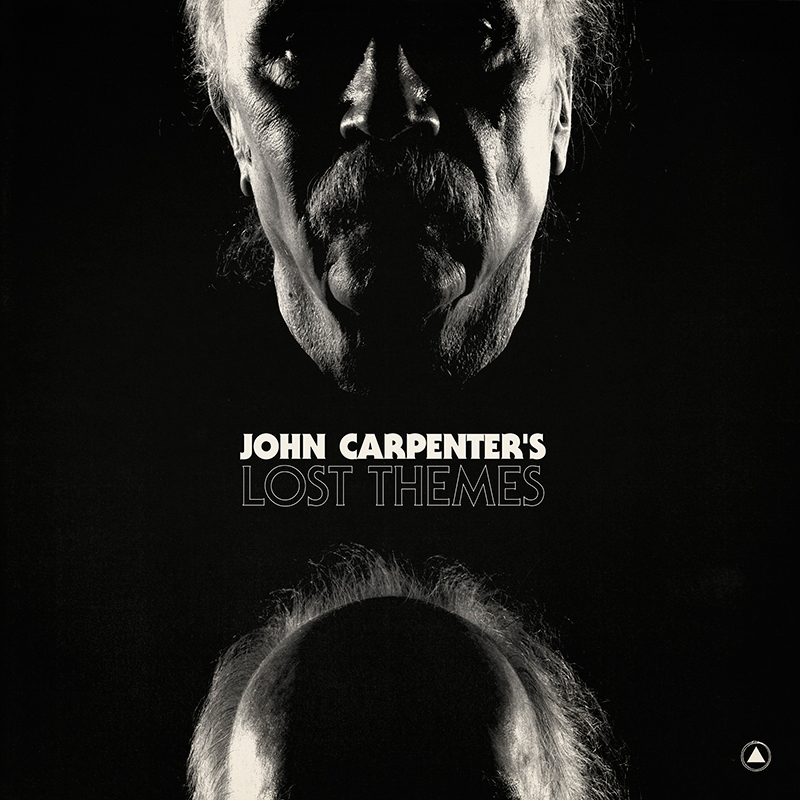20 Questions: John Carpenter
Before his first-ever artist album drops next month, the legendary director and composer talks about movies, growing up, and his favorite synth.

20 Questions: John Carpenter
Before his first-ever artist album drops next month, the legendary director and composer talks about movies, growing up, and his favorite synth.

John Carpenter is a whole lot of things. At the age of 67, he’s an accomplished and highly influential filmmaker, a pioneering soundtrack composer, a writer, a musician, a father, a godfather, an Academy Award winner, and a world-renowned authority on the horror and science-fiction genres, just to name a handful of titles. So maybe that all goes to explain the one thing he isn’t: a man with something to prove. Following a prolific career that all but dwindled away after 2001’s Ghosts of Mars (save for a one-off TV episode and 2010 film The Ward), Carpenter has spent a major portion of the past 15 years out of the spotlight, and few would have expected him to make a return, especially not with something he’s never done before. But Lost Themes is precisely that, a nine-song record which marks the auteur’s first release of non-soundtrack music. It’s an exciting album for Carpenter’s cult following, as the hallmarks of his synth-centric compositions are all accounted for in the shadowy and propulsive instrumentals, and is hopefully an effort that will spark new avenues of expression from the veteran artist.
Ask him about it, though, and he’ll likely deliver a less-than-enthusiastic response. Like we said, Carpenter is a certified legend with nothing to prove, and as it turns out, he’s also not particularly fond of interviews. We rang him up at his Southern California home to run some questions by him, and though he was willing to oblige, well… let’s just say he played it very close to the chest. All of which is to say that this may be one of the shorter installments of 20 Questions, but it is nonetheless coming from an unquestionably important figure in worlds of film and music. Thankfully, Carpenter does let us know about some of his earliest inspirations, what his key to being a successful filmmaker is, why he prefered writing and recording Lost Themes to scoring movies, how much it would take for him to perform his new album live, and plenty of other trivia tidbits.
1. Where were you born and raised?
Carthage, New York. I was raised someplace else: Bowling Green, Kentucky.
2. Do you come from a very creative family?
Yes, my father was a music professor and an accomplished violinist from the Eastman School of Music. That’s where I got my musical background.
3. Were you ever formally trained in music and composition?
Yes, my father taught me how to play the violin and began teaching me how to play the piano. So I was trained, yeah. Not very well: I had no talent at the violin. But I was trained at home, and I took individual tutorship training from teachers.
4. How did you get into making music with synthesizers?
It was a form of necessity early on in my career. When you’re making a low-budget film, you don’t have the money to hire a composer and an orchestra, so I had the ability to do it myself. All I needed was a computer, a synthesizer, to make keyboards sound bigger.
5. What are some of your favorite synthesizers you’ve owned?
My favorite synthesizer is a Korg Triton. I’ve had that for the last 15 years.

6. Which was your first love, film or music?
Film. I would go to the movies when I was really young. My mother would take me, she was a movie fanatic. One of the earliest memories of mine was seeing The African Queen with her. I forget what year that was, but I was all of four years old.
7. Did you ever want to do anything besides make movies?
Not really. In 1956, I saw a movie that transformed me, called Forbidden Planet, which coincidentally had the first totally synthesized score. It was not an orchestral score. That movie made me want to be a movie director.
8. What initially drew you to action and horror films?
I didn’t initially go to them, they came to me. I made one that was successful, and then I got typecast. I was fine with it, though, because I grew up loving horror and science fiction.
9. What key lessons did you learn during your early years of filmmaking?
Well, the biggest lesson that I learned from film school was to try to get and maintain, if possible, final cut. Creative control is the essence of having the ability to make your own movie, and not someone else’s.
10. Which bands and musicians do you remember being influential to your film scores?
The Beatles, The Rolling Stones, Procol Harum…

11. Lost Themes will be your first musical release that isn’t a soundtrack. Why is now the right time for you to make a record like this?
It all happened because of luck. It’s the right time because it just happened. My son and I improvised most of this music, and my godson and I improvised the rest of it. We had it sent to a record company, and they wanted to release it.
12. Unlike your soundtracks, the music of Lost Themes is said to have been composed without referencing any imagery. Were there any obstacles in working that way?
No, it was an absolute joy.
13. Did you prefer it to working on soundtracks?
Hell, yes! There were no deadlines, no one looking over your shoulder, nobody telling you, “Well, that doesn’t work.”
14. Have you found yourself creating your own narrative or visuals for the album?
Some images come to mind when I listen to the music, sure, but I can’t tell you [what they are].
15. Aside from its creative process, how is the music of Lost Themes different from your soundtrack work?
That’s a hard question to answer. Lost Themes, in some places, is a bit more complex than some of the stuff I’ve done before. It happens when you evolve as a musician.
16. Is there a film of yours that Lost Themes reminds you of the most?
No.
17. Do you have plans for any live performances of Lost Themes?
We would love to play live! All you have to provide is a million dollars. Because it would be hard to [make it] sound like the album. You can’t do it cheaply. There’s a lot of instrumentation, and a lot of technical work. Or we could reinvent the album as rock & roll, and play it with a four- or five-piece group.
18. Have you enjoyed any new films lately?
Several, yeah. In the past few years, I’ve enjoyed a lot. In 2008, there was a horror film called Let the Right One In that I thought was excellent. I liked World War Z a lot. I liked Gravity a lot. I haven’t finished seeing all of this year’s movies yet.
19. Any recent film composers or scores you’re particularly fond of?
I love the work of Hans Zimmer. I think Trent Reznor has done some nice stuff in the kind of avant-garde area.
20. What’s the first thing you’ll do after answering these questions?
I’m sitting here in beautiful Hollywood, California, drinking my coffee and watching a press conference with President Obama and David Cameron. When we’re finished talking, I’ll finish my coffee and continue to watch the press conference.

